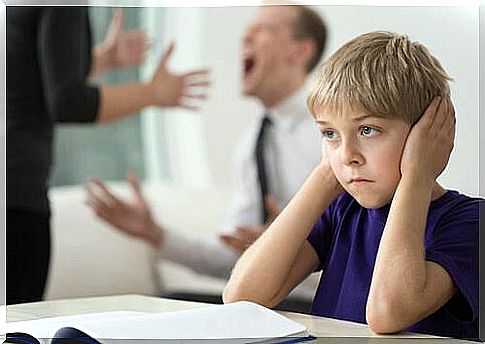Not Arguing In Front Of The Children Is Important For Development

Unfortunately, many children see their parents argue. Here you will find out how parental disputes can affect children and why it is better not to argue in front of the children.
It’s normal that parents don’t always have the same opinion. But you should still try to stay calm and find solutions. If not, remember: You should n’t argue in front of the children .
Ideally, you should have a conversation in which both parents listen to each other. In many cases, however, parents have different views and a loud argument ensues.
Most children become very worried when their parents argue, and this makes them feel anxious, sad, or worried overall. Even if they are silent about it, they can develop guilty feelings.
Loud parental arguments can also affect a child’s mental health and development of social and emotional skills, as well as academic performance and the child’s ability to build future relationships.
One study also found that unresolved conflicts between parents have a strong impact on children’s early development, mental health, and future life chances.
Why not argue in front of children?
Avoid arguing in front of children for the following reasons:
1. Children are not yet emotionally stable
Arguments make children feel insecure about family stability. Children who experience a lot of quarrels may worry about parenting separation.
It can also be difficult for them to gain a sense of stability in their family, as the reasons for the arguments can be unpredictable and thus they can arise at any time.

2. The parent-child relationship can be disrupted
Conflicts are stressful for children and undoubtedly also for parents. A parent who is under stress pays less attention to the children. It can also become more difficult to show warmth and affection when the children are internally angry and upset about the attitudes of the “grown-ups”.
3. Arguing creates a tense environment
Arguments are very uncomfortable for children and cause stress. These situations can affect your child’s physical and mental well-being and normal, healthy development.
Research found that stress from family conflicts can affect a child’s cognitive performance.
The researchers also found that children have greater difficulty regulating their attention and emotions when their parents argue a lot. In addition, their ability to solve problems effectively is impaired.
Better not argue in front of the children
Children worry a lot about parental discussions. This leads them to jump to conclusions and think that their parents are no longer in love.
Of course, not every argument means that parents don’t love each other or that they want to break up. Fortunately, conflict is usually just a way to relieve tension when you’ve had a bad day or disagree.
Children of all ages can be influenced by conflicts between parents. The consequences are usually high levels of aggression, rejection and violence. Internally, they can develop low self-esteem and episodes of anxiety and depression.

How do children feel about parental disputes?
In general, children are concerned when they see or hear their parents arguing. It is hard for her to endure the screams and the unpleasant words. Likewise, seeing angry and out of control parents can make infants feel unprotected and frightened.
Children can worry about a parent during discussions . They often think that one parent is particularly sad or hurt.
Sometimes parents’ arguments make children cry or even cause physical discomfort. For example, psychosomatic stomach pain may occur, or they may have difficulty sleeping or concentrating at school.
Also, remember that the parent’s behavior is a very important part of the child’s life because the parent is a behavior model. So don’t forget: don’t argue in front of the children!









